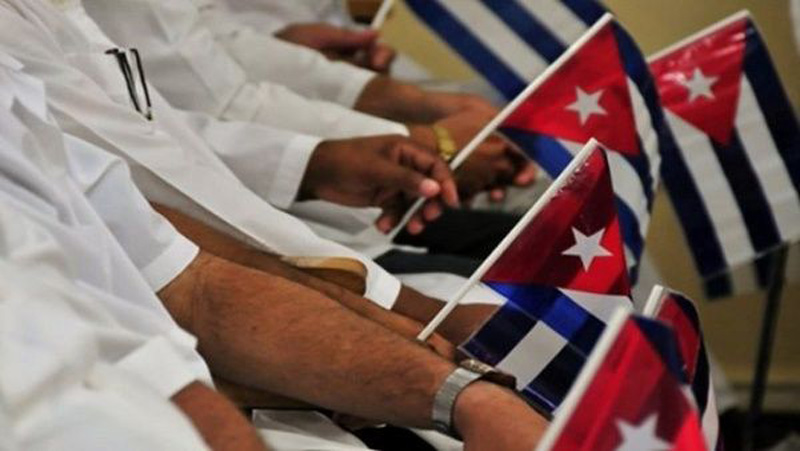Another Perverse Mechanism to Encourage the Theft of Talent
- Written by Redacción ¡ahora!
- Published in Health
- Hits: 1571

“They attempt to impose a perverse mechanism to encourage eth theft of talent. One more anti-Cuba campaign, indicative of the impotence of imperialism in the face of the Revolution’s conquests. Its promoters are incapable of facilitating a civilized relationship; their arrogance blinds them,” said Miguel Díaz-Canel Bermúdez, President of Cuba’s Councils of State and Minister, in the wake of a new effort to reestablish the parole program for Cuban doctors, via a bipartisan proposal by Senators Marco Rubio (R-Florida), and Bob Menéndez (D-New Jersey), who have a long record of attacks on Cuba.
For his part, the Cuban Foreign Ministry’s director for the United States, Carlos Fernández de Cossío, condemned the introduction of this proposal to reactivate the program, and commented on the Senators’ initiative on his Twitter account, "Impotent resentment of Cuba has no limits. Unable to detain our recognized professional human development, quality baseball, and investment potential, Bob Menéndez and Rubio want to restore the brain drain program to steal Cuban doctors," Cossío tweeted.
The project consisted of granting visas to doctors and other Cuban health personnel working abroad in the country’s international missions. The parole program was part of the arsenal of measures used to deprive the country of doctors, nurses, and other health professionals, in a virtual international operation of brain theft promoted by the U.S. government, created in 2006 by George W. Bush, although its origins date back to the early days of the Revolution, when Cuba was left with half of the doctors it had in 1959. The program applies only to Cubans.
The program was suspended on January 12, 2017, eight days before the inauguration of President Donald Trump, along with the wet foot–dry foot policy, in an effort to promote regular, safe, orderly migration between the two countries. The Senators now brazenly accuse Cuban medical services, which have saved hundreds of thousands of lives around the world, of "human trafficking," and are seeking to restore the refugee program for physicians who "escape" from official Cuban missions abroad.
At the same time, they requested that the State Department toughen up Cuba's classification in its annual report on human trafficking in the world.
On July 11, 2018, a new round of migratory talks was held in Washington between delegations from the two countries.
Both parties acknowledged the benefits of the Joint Declaration of January 12, 2017, in particular the elimination of the "wet foot-dry foot" policy and the "Parole Program for Cuban Medical Professionals" in the reduction of irregular emigration. They also agreed on the usefulness of the exchange between border control troops and the Coast Guard held in January 2018, and the technical meeting on trafficking in persons and immigration fraud held in December of 2017.
During these talks, compliance with bilateral agreements was reviewed, in order to guarantee regular, safe, orderly migration; discourage irregular migration; as well as prevent and confront related illicit activity. Cuba demonstrated that the country is strictly complying with its obligations, and reiterated its willingness to maintain and expand bilateral cooperation in this area.
The Cuban delegation urged the U.S. government to fully comply with its commitments to issue visas for migrants, in accordance with the Migration Agreements; and noted that the decision to suspend visa processing services at the embassy in Havana directly affects migratory relations, family ties, damaging institutional exchanges and travel between the two countries. On the other hand, concern was expressed about the Cuban Adjustment Act, which, along with other U.S. regulations, encourages irregular emigration of Cubans and exposes them to the risk of becoming victims of illegal traffickers and gangs associated with organized crime. / Granma
